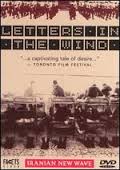
LETTERS IN THE WIND
Iran, 2002, 75 minutes, Black and white.
Directed by Ali Reza Amini.
Letters in the Wind is a film about Iranian national service. It is a brief film, showing the call-up, the entry into the camp, the camaraderie amongst the men, the training. It also highlights the regimentation of the recruits. The film focuses on two young men, one from the city, one from the country. They confide in each other after clashing. The one from the city has concealed a tape recorder, after everything else personal had been confiscated. He plays material that he has taped and everybody wants to listen. When he gets leave, after a conversation with his friend, he goes into Teheran, plays over the phone the messages that various soldiers have recorded. He then goes around the streets taping material that he brings back for the soldiers to listen to. They are caught listening to the material and hurried out on a further bivouac in the snow.
1. A portrait of young men in Iran? Born in 1982? Going into conscription?
2. The atmosphere of the conscripts, the army, the camp outside the capital, the nature of the camp, the mountainous terrain, the seasons, the snow? The musical score and songs? The editing and pace?
3. The title, the use of the tape recorder, the recordings, the messages, over the phone, in the wind?
4. The detail of the film: the range of men and the call-up, the registration, the pre-credits sequence with its newsreel footage style? The regimentation and marching, the haircuts, the getting of the clothes, the exercises and marching, sitting up and standing up? The barracks?
5. The training, the discipline, the attitude of the captain? The exercises, the training with the bayonet?
6. The men in the barracks, the focus on the two young men, their clash, crawling along the road? The discussions, the telling of the stories? The man from the country and his romanticism? The focus on the silhouettes of the two men talking?
7. The men recording their messages?
8. The young soldier going to Teheran, the city and the cityscapes, his trying to find the phone exchange, people's reactions? His playing the messages over the phone? Going through the streets and taping the sounds?
9. His return, the young men eager to listen? Their being interrupted and sent up the mountain?
10. A perspective on Iranian young men? Military training and its effect? The focus on individuals and the regimentation for society?